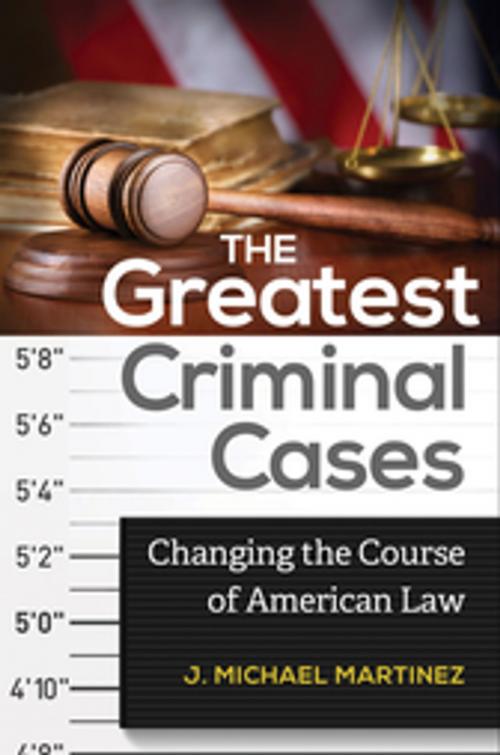The Greatest Criminal Cases: Changing the Course of American Law
Nonfiction, Reference & Language, Law, Criminal law, Social & Cultural Studies, Social Science, Crimes & Criminals, Criminology| Author: | J. Michael Martinez | ISBN: | 9781440828690 |
| Publisher: | ABC-CLIO | Publication: | March 28, 2014 |
| Imprint: | Praeger | Language: | English |
| Author: | J. Michael Martinez |
| ISBN: | 9781440828690 |
| Publisher: | ABC-CLIO |
| Publication: | March 28, 2014 |
| Imprint: | Praeger |
| Language: | English |
Many constitutional protections that Americans take for granted today—the right to exclude illegally obtained evidence, the right to government-financed counsel, and the right to remain silent, among others—were not part of the original Bill of Rights, but were the result of criminal trials and judicial interpretations. The untold stories behind these cases reveal circumstances far more interesting than any legal dossier can evoke. Author J. Michael Martinez provides a brief introduction to the drama and intrigue behind 14 leading court cases in American law.
This engaging text presents a short summary of high-profile legal proceedings from the late 19th century through recent times and includes key landmark cases in which the court established the parameters of probable cause for searches, the features of due process, and the legality of electronic surveillance. The work offers concise explanations and analysis of the facts as well as the lasting significance of the cases to criminal procedure.
Many constitutional protections that Americans take for granted today—the right to exclude illegally obtained evidence, the right to government-financed counsel, and the right to remain silent, among others—were not part of the original Bill of Rights, but were the result of criminal trials and judicial interpretations. The untold stories behind these cases reveal circumstances far more interesting than any legal dossier can evoke. Author J. Michael Martinez provides a brief introduction to the drama and intrigue behind 14 leading court cases in American law.
This engaging text presents a short summary of high-profile legal proceedings from the late 19th century through recent times and includes key landmark cases in which the court established the parameters of probable cause for searches, the features of due process, and the legality of electronic surveillance. The work offers concise explanations and analysis of the facts as well as the lasting significance of the cases to criminal procedure.






![Cover of the book Encyclopedia of African Colonial Conflicts [2 volumes] by J. Michael Martinez](https://www.kuoky.com/images/2016/november/300x300/9781598848373-mzx1_300x.jpg)

![Cover of the book A History of Counterinsurgency [2 volumes] by J. Michael Martinez](https://www.kuoky.com/images/2015/may/300x300/9781440804250-ns4D_300x.jpg)




![Cover of the book The World of the American Revolution: A Daily Life Encyclopedia [2 volumes] by J. Michael Martinez](https://www.kuoky.com/images/2015/august/300x300/9781440830280-TJGj_300x.jpg)

